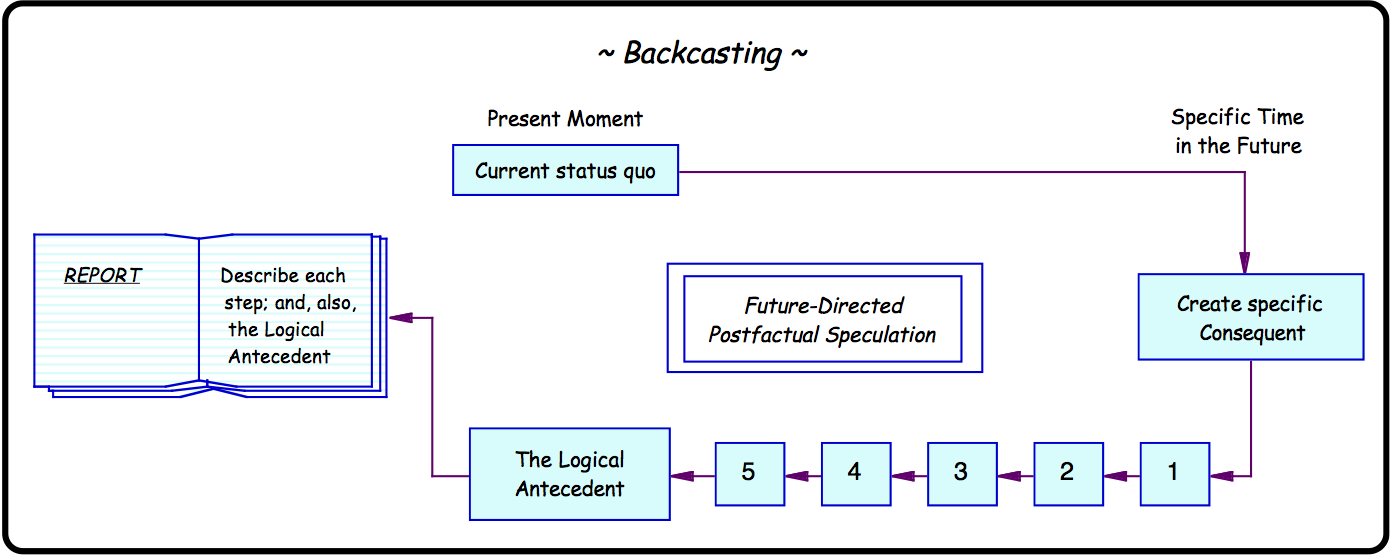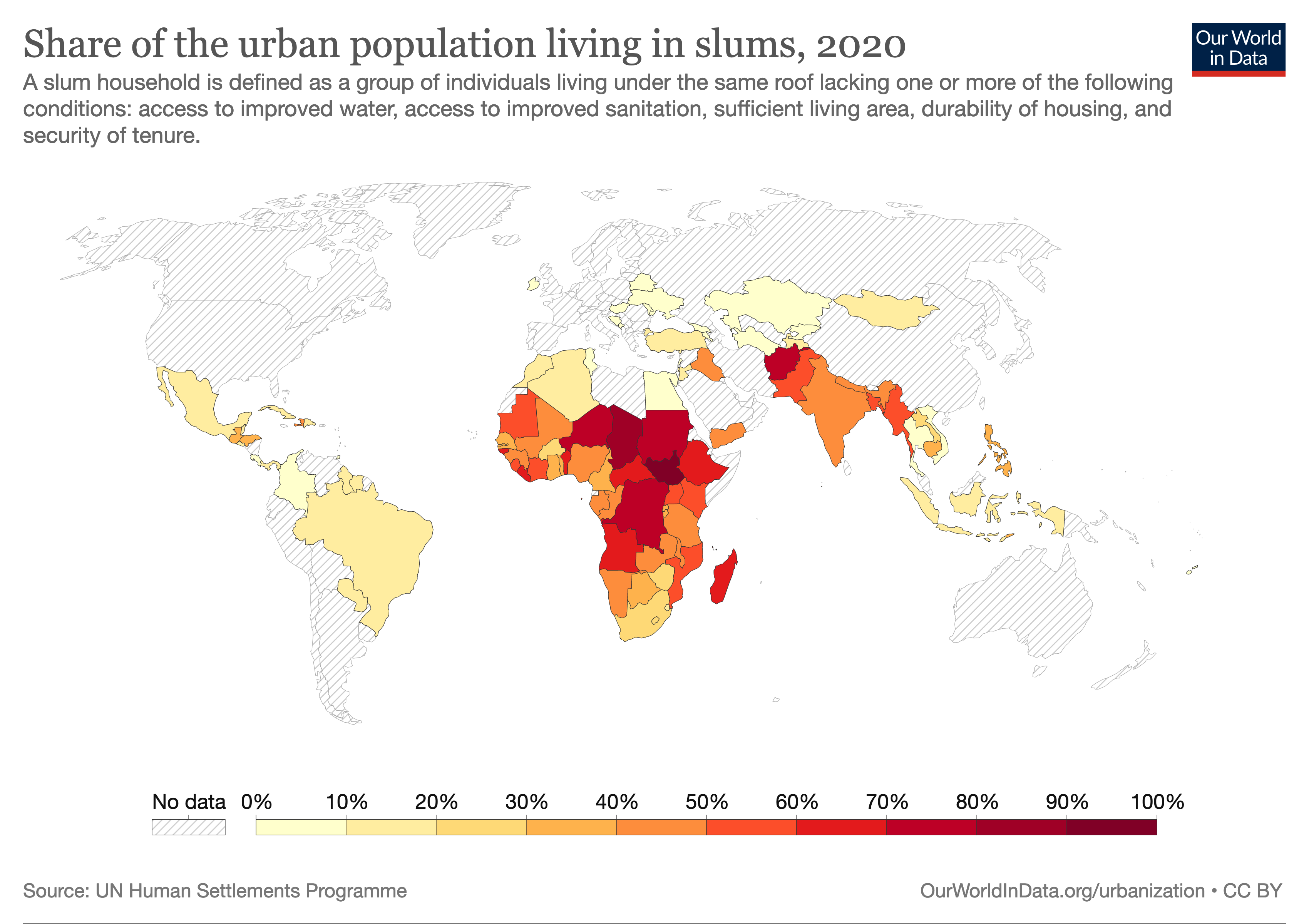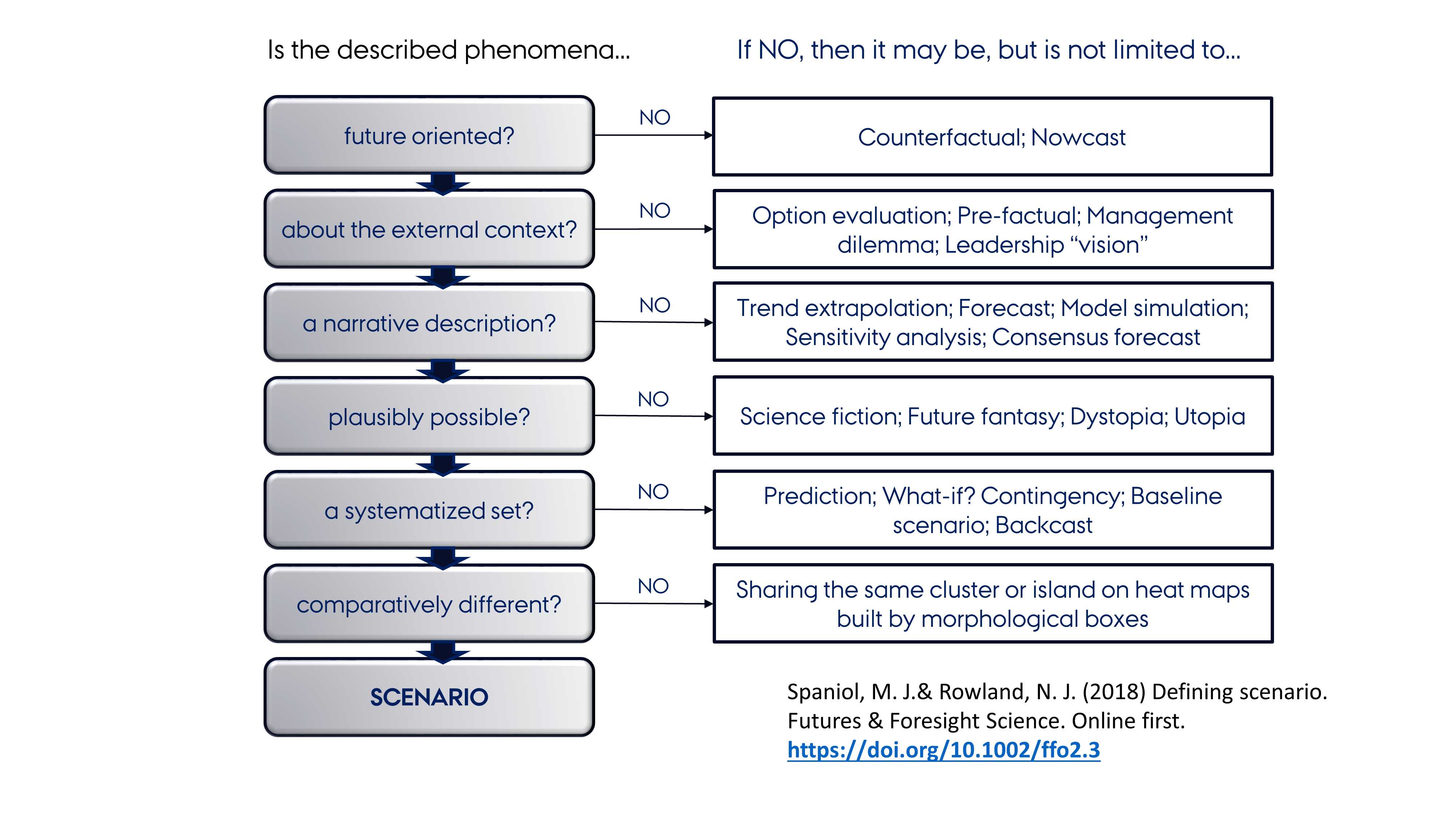|
Transition Scenario
Transition scenarios are descriptions of future states which combine a future image with an account of the changes that would need to occur to reach that future. These two elements are often created in a two-step process where the future image is created first (envisioning) followed by an exploration of the alternative pathways available to reach the future goal (backcasting). Both these processes can use participatory techniques (Raskin et al., 2002) where participants of varying backgrounds and interests are provided with an open and supportive group environment to discuss different contributing elements and actions. Transition scenarios are unique in type not only in terms of how they are created (process) but also their content. Their requirements are guided by transition management concepts and consider the "fundamental and irreversible change in the culture, structure and practices of a system" (Sondeijker, 2009:52,). Transition scenarios are emerging as a scenario type which i ... [...More Info...] [...Related Items...] OR: [Wikipedia] [Google] [Baidu] |
Backcasting
Backcasting is a planning method that starts with defining a desirable future and then works backwards to identify policies and programs that will connect that specified future to the present. The fundamentals of the method were outlined by John B. Robinson from the University of Waterloo in 1990.Robinson, John B. 1990. Futures under glass: a recipe for people who hate to predict ''Futures'', vol. 22, issue 8, pp. 820–842. The fundamental question of backcasting asks: "if we want to attain a certain goal, what actions must be taken to get there?" While forecasting involves predicting the future based on current trend analysis, backcasting approaches the challenge of discussing the future from the opposite direction; it is "a method in which the future desired conditions are envisioned and steps are then defined to attain those conditions, rather than taking steps that are merely a continuation of present methods extrapolated into the future". In statistics and data analysis, back ... [...More Info...] [...Related Items...] OR: [Wikipedia] [Google] [Baidu] |
Stockholm Environment Institute
The Stockholm Environment Institute, or SEI, is a non-profit, independent research and policy institute specialising in sustainable development and environmental issues, with seven affiliate offices around the world. SEI works on climate change, energy systems, water resources, air quality, land-use, sanitation, food security, and trade issues with the aim to shift policy and practice towards sustainability. SEI wants to support decision-making and induce change towards sustainable development around the world by providing knowledge that bridges science and policy in the field of environment and development. History SEI was established in 1989 as an initiative of the Government of Sweden. The name of the Stockholm Environment Institute is derived from the 1972 UN Conference on the Human Environment in Stockholm. Activities Programs * Ecological Sanitation Research Programme * LEAP: Long-range Energy Alternatives Planning System * Resources and Energy Analysis Programm ... [...More Info...] [...Related Items...] OR: [Wikipedia] [Google] [Baidu] |
Futures Studies
Futures studies, futures research, futurism or futurology is the systematic, interdisciplinary and holistic study of social and technological advancement, and other environmental trends, often for the purpose of exploring how people will live and work in the future. Predictive techniques, such as forecasting, can be applied, but contemporary futures studies scholars emphasize the importance of systematically exploring alternatives. In general, it can be considered as a branch of the social sciences and an extension to the field of history. Futures studies (colloquially called "futures" by many of the field's practitioners) seeks to understand what is likely to continue and what could plausibly change. Part of the discipline thus seeks a systematic and pattern-based understanding of past and present, and to explore the possibility of future events and trends. Unlike the physical sciences where a narrower, more specified system is studied, futurology concerns a much bigger and ... [...More Info...] [...Related Items...] OR: [Wikipedia] [Google] [Baidu] |
Environmental Social Science Concepts
A biophysical environment is a biotic and abiotic surrounding of an organism or population, and consequently includes the factors that have an influence in their survival, development, and evolution. A biophysical environment can vary in scale from microscopic to global in extent. It can also be subdivided according to its attributes. Examples include the marine environment, the atmospheric environment and the terrestrial environment. The number of biophysical environments is countless, given that each living organism has its own environment. The term ''environment'' can refer to a singular global environment in relation to humanity, or a local biophysical environment, e.g. the UK's Environment Agency. Life-environment interaction All life that has survived must have adapted to the conditions of its environment. Temperature, light, humidity, soil nutrients, etc., all influence the species within an environment. However, life in turn modifies, in various forms, its conditions. ... [...More Info...] [...Related Items...] OR: [Wikipedia] [Google] [Baidu] |
Environmental Policy
Environmental policy is the commitment of an organization or government to the laws, regulations, and other policy mechanisms concerning environmental issues. These issues generally include air and water pollution, waste management, ecosystem management, maintenance of biodiversity, the management of natural resources, wildlife and endangered species. For example, concerning environmental policy, the implementation of an eco-energy-oriented policy at a global level to address the issues of global warming and climate changes could be addressed. Policies concerning energy or regulation of toxic substances including pesticides and many types of industrial waste are part of the topic of environmental policy. This policy can be deliberately taken to influence human activities and thereby prevent undesirable effects on the biophysical environment and natural resources, as well as to make sure that changes in the environment do not have unacceptable effects on humans. Definition One ... [...More Info...] [...Related Items...] OR: [Wikipedia] [Google] [Baidu] |
Transition Town
The terms transition town, transition initiative and transition model refer to grassroots, grassroot community projects that aim to increase self-sufficiency to reduce the potential effects of peak oil, Global warming, climate destruction, and economic instabilitythrough renewed localization strategies, especially around food production and energy usage. In 2006, the founding of Transition Town Totnes in the United Kingdom became an inspiration for other groups to form. The Transition Network charity was founded in early 2007, to support these projects. A number of the groups are officially registered with the Transition Network. Transition initiatives have been started in locations around the world, with many located in the United Kingdom and others in Europe, North America and Australia. While the aims remain the same, Transition initiatives' solutions are specific depending on the characteristics of the local area. Etymology The term, "transition town" was coined by Louise Roone ... [...More Info...] [...Related Items...] OR: [Wikipedia] [Google] [Baidu] |
Transition Management (governance)
Transition management is a governance approach that aims to facilitate and accelerate sustainability transitions through a participatory process of visioning, learning and experimenting. In its application, transition management seeks to bring together multiple viewpoints and multiple approaches in a 'transition arena'. Participants are invited to structure their shared problems with the current system and develop shared visions and goals which are then tested for practicality through the use of experimentation, learning and reflexivity. The model is often discussed in reference to sustainable development and the possible use of the model as a method for change. Key principles to transition management as a form of governance: * seeks to widen participation by taking a multi-actor approach in order to encompass societal values and beliefs * takes a long-term perspective (between 1-3 generations) creating a basket of visions in which short-term objectives can be identified * focuse ... [...More Info...] [...Related Items...] OR: [Wikipedia] [Google] [Baidu] |
Sustainable City
The sustainable city, eco-city, or green city is a city designed with consideration for social, economic, environmental impact (commonly referred to as the triple bottom line), and resilient habitat for existing populations, without compromising the ability of future generations to experience the same. The UN Sustainable Development Goal 11 defines sustainable cities as those that are dedicated to achieving green sustainability, social sustainability and economic sustainability. They are committed to doing so by enabling opportunities for all through a design focused on inclusivity as well as maintaining a sustainable economic growth. The focus also includes minimizing required inputs of energy, water, and food, and drastically reducing waste, output of heat, air pollution – , methane, and water pollution. Richard Register first coined the term ''ecocity'' in his 1987 book ''Ecocity Berkeley: Building Cities for a Healthy Future,'' where he offers innovative city planning sol ... [...More Info...] [...Related Items...] OR: [Wikipedia] [Google] [Baidu] |
Scenario Planning
Scenario planning, scenario thinking, scenario analysis, scenario prediction and the scenario method all describe a strategic planning method that some organizations use to make flexible long-term plans. It is in large part an adaptation and generalization of classic methods used by military intelligence. In the most common application of the method, analysts generate simulation games for policy makers. The method combines known facts, such as demographics, geography and mineral reserves, with military, political, and industrial information, and key driving forces identified by considering social, technical, economic, environmental, and political ("STEEP") trends. In business applications, the emphasis on understanding the behavior of opponents has been reduced while more attention is now paid to changes in the natural environment. At Royal Dutch Shell for example, scenario planning has been described as changing mindsets about the exogenous part of the world prior to formulating ... [...More Info...] [...Related Items...] OR: [Wikipedia] [Google] [Baidu] |
Paul Raskin
Paul Raskin is the founding President of the Tellus Institute, which has conducted over 3,500 research and policy projects throughout the world on environmental issues, resource planning, scenario analysis, and sustainable development. His research and writing has centered on propagating the Great Transition. Raskin has served as a lead author on a number of high-profile international reports, including the U.S. National Academy of Science's Board on Sustainability, the Millennium Ecosystem Assessment, the United Nations Environment Programme's Global Environment Outlook, the Earth Charter, and the Intergovernmental Panel on Climate Change (IPCC) Third Assessment Report. Background Born in Chicago in 1942, Raskin was raised in California, receiving a B.A. in physics and philosophy in 1964 from the University of California, Berkeley, where his senior thesis was supervised by philosopher of science Paul Feyerabend. He went on to earn a Ph.D. in theoretical physics from Columbia Uni ... [...More Info...] [...Related Items...] OR: [Wikipedia] [Google] [Baidu] |
Scenario Analysis
Scenario planning, scenario thinking, scenario analysis, scenario prediction and the scenario method all describe a strategic planning method that some organizations use to make flexible long-term plans. It is in large part an adaptation and generalization of classic methods used by military intelligence. In the most common application of the method, analysts generate simulation games for policy makers. The method combines known facts, such as demographics, geography and mineral reserves, with military, political, and industrial information, and key driving forces identified by considering social, technical, economic, environmental, and political ("STEEP") trends. In business applications, the emphasis on understanding the behavior of opponents has been reduced while more attention is now paid to changes in the natural environment. At Royal Dutch Shell for example, scenario planning has been described as changing mindsets about the exogenous part of the world prior to formulating ... [...More Info...] [...Related Items...] OR: [Wikipedia] [Google] [Baidu] |
Oil Depletion Analysis Centre
The Oil Depletion Analysis Centre (ODAC) is an independent, UK-registered educational charity. The centre is working to raise international public awareness and promote better understanding of the world's oil depletion and peak oil problem. It is based in London and belongs to the New Economics Foundation. ODAC was founded in June 2001 on the belief that an informed public debate about the likely impacts of depleting oil supplies is critically needed. A growing number of experts now predict that world oil production has peaked or will reach its physical peak within the coming decade and then start to permanently decline. The prevailing view of most energy policy-makers and institutions is that near-term oil supply is mainly an economic and geopolitical concern. Under almost any scenario, however, lead time is running short for a smooth transition to new energy systems and a less oil-dependent way of life. On 30 March 2012, the activities of the Oil Depletion Analysis Centre (O ... [...More Info...] [...Related Items...] OR: [Wikipedia] [Google] [Baidu] |



